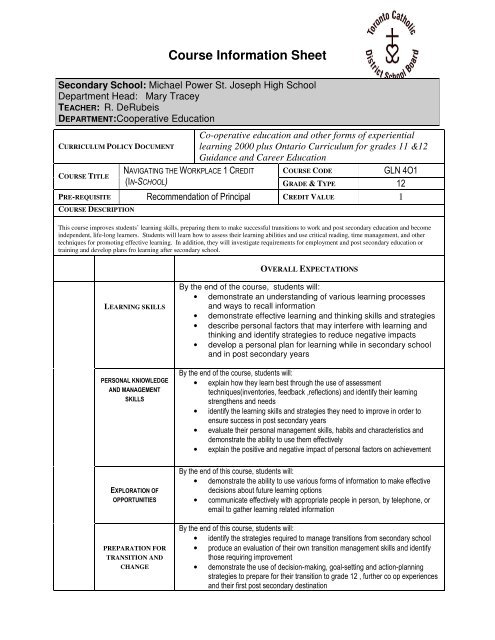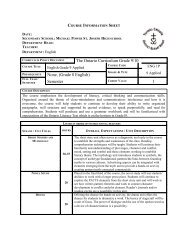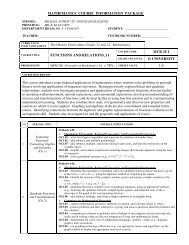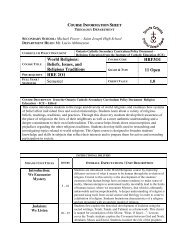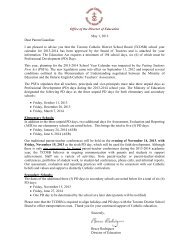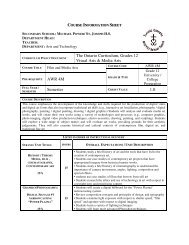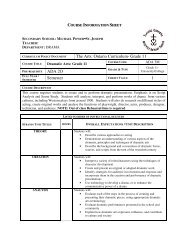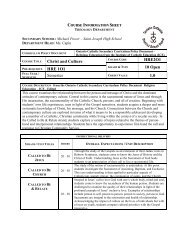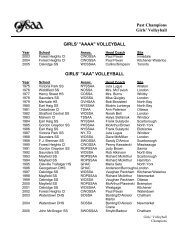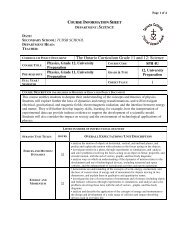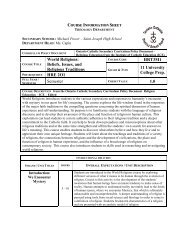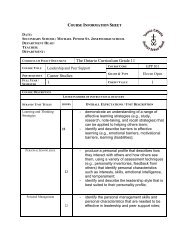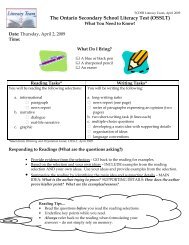Course Information Sheet - MPSJ.ca
Course Information Sheet - MPSJ.ca
Course Information Sheet - MPSJ.ca
Create successful ePaper yourself
Turn your PDF publications into a flip-book with our unique Google optimized e-Paper software.
<strong>Course</strong> <strong>Information</strong> <strong>Sheet</strong><br />
Secondary School: Michael Power St. Joseph High School<br />
Department Head: Mary Tracey<br />
TEACHER: R. DeRubeis<br />
DEPARTMENT: Cooperative Edu<strong>ca</strong>tion<br />
Co-operative edu<strong>ca</strong>tion and other forms of experiential<br />
CURRICULUM POLICY DOCUMENT learning 2000 plus Ontario Curriculum for grades 11 &12<br />
Guidance and Career Edu<strong>ca</strong>tion<br />
NAVIGATING THE WORKPLACE 1 CREDIT COURSE CODE<br />
GLN 4O1<br />
COURSE TITLE<br />
(IN-SCHOOL) GRADE & TYPE 12<br />
PRE-REQUISITE Recommendation of Principal CREDIT VALUE 1<br />
COURSE DESCRIPTION<br />
This course improves students’ learning skills, preparing them to make successful transitions to work and post secondary edu<strong>ca</strong>tion and become<br />
independent, life-long learners. Students will learn how to assess their learning abilities and use criti<strong>ca</strong>l reading, time management, and other<br />
techniques for promoting effective learning. In addition, they will investigate requirements for employment and post secondary edu<strong>ca</strong>tion or<br />
training and develop plans fro learning after secondary school.<br />
OVERALL EXPECTATIONS<br />
LEARNING SKILLS<br />
PERSONAL KNIOWLEDGE<br />
AND MANAGEMENT<br />
SKILLS<br />
By the end of the course, students will:<br />
• demonstrate an understanding of various learning processes<br />
and ways to re<strong>ca</strong>ll information<br />
• demonstrate effective learning and thinking skills and strategies<br />
• describe personal factors that may interfere with learning and<br />
thinking and identify strategies to reduce negative impacts<br />
• develop a personal plan for learning while in secondary school<br />
and in post secondary years<br />
By the end of the course, students will:<br />
• explain how they learn best through the use of assessment<br />
techniques(inventories, feedback ,reflections) and identify their learning<br />
strengthens and needs<br />
• identify the learning skills and strategies they need to improve in order to<br />
ensure success in post secondary years<br />
• evaluate their personal management skills, habits and characteristics and<br />
demonstrate the ability to use them effectively<br />
• explain the positive and negative impact of personal factors on achievement<br />
EXPLORATION OF<br />
OPPORTUNITIES<br />
PREPARATION FOR<br />
TRANSITION AND<br />
CHANGE<br />
By the end of this course, students will:<br />
• demonstrate the ability to use various forms of information to make effective<br />
decisions about future learning options<br />
• communi<strong>ca</strong>te effectively with appropriate people in person, by telephone, or<br />
email to gather learning related information<br />
By the end of this course, students will:<br />
• identify the strategies required to manage transitions from secondary school<br />
• produce an evaluation of their own transition management skills and identify<br />
those requiring improvement<br />
• demonstrate the use of decision-making, goal-setting and action-planning<br />
strategies to prepare for their transition to grade 12 , further co op experiences<br />
and their first post secondary destination
LEARNING SKILLS CRITERIA<br />
IN EACH REPORTING PERIOD, REPORT ON THE QUALITY OF THE LEARNING SKILLS DEMONSTRATED BY THE<br />
STUDENT IN EACH OF THE CATEGORIES IDENTIFIED ON THE REPORT CARD USING THE FOLLOWING LETTER<br />
SYMBOLS.<br />
E–EXCELLENT G–GOOD S–SATISFACTORY N–NEEDS IMPROVEMENT<br />
SKILL: WORKS INDEPENDENTLY<br />
INDICATORS:<br />
• accomplishes tasks independently<br />
• accepts responsibility for completing tasks<br />
• follows instructions<br />
• regularly completes assignments on time and with <strong>ca</strong>re<br />
• demonstrates self-direction in learning<br />
• independently selects, evaluates, and uses appropriate<br />
learning materials, resources, and activities<br />
• organizes work when faced with a number of tasks<br />
• devises and follows a coherent plan to complete a task<br />
• follows specific steps to reach goals or to make<br />
improvements<br />
• revises steps and strategies when necessary to achieve a goal<br />
• seeks out new opportunities for learning<br />
• responds to challenges and takes risks<br />
• demonstrates interest and curiosity about concepts, objects,<br />
events, and resources<br />
• seeks necessary and additional information in print,<br />
electronic, and media resources<br />
• identifies problems to solve, conducts investigations, and<br />
generates questions for further inquiry<br />
• requires little prompting to complete a task, displaying selfmotivation<br />
and self-direction<br />
SKILL: ORGANIZATION<br />
INDICATORS:<br />
SKILL: INITIATIVE<br />
INDICATORS:<br />
SKILL: TEAMWORK<br />
INDICATORS:<br />
• demonstrates persistence in bringing tasks to completion<br />
• uses time effectively<br />
• uses prior knowledge and experience to solve problems and<br />
make decisions<br />
• reflects on learning experiences<br />
• manages and uses time effectively and creatively<br />
• demonstrates ability to organize and manage information<br />
• follows an effective process for inquiry and research<br />
• uses appropriate information technologies to organize<br />
information and tasks<br />
• approaches new learning situations with confidence and a<br />
positive attitude<br />
• develops original ideas and devises innovative procedures<br />
• attempts a variety of learning activities<br />
• seeks assistance when needed<br />
• uses information technologies in creative ways to improve<br />
learning for self or others<br />
• works willingly and cooperatively with others<br />
• questions the ideas of the group to seek clarifi<strong>ca</strong>tion, test<br />
• shares resources, materials, and equipment with others thinking, or reach agreement<br />
• responds and is sensitive to the needs and welfare of others • shows respect for the ideas and opinions of others in the group<br />
• solves problems collaboratively<br />
or class<br />
• accepts various roles, including leadership roles<br />
• listens attentively, without interrupting<br />
• takes responsibility for his or her own share of the work to be • in discussions, paraphrases points of view and asks questions<br />
done<br />
to clarify meaning and promote understanding<br />
• works to help achieve the goals of the group or the class • recognizes the contribution of group members by means of<br />
• helps to motivate others, encouraging them to participate encouragement, support, or praise<br />
• contributes information and ideas to solve problems and • seeks consensus and negotiates agreement before making<br />
make decisions<br />
decisions<br />
SKILL: WORK HABITS/HOMEWORK<br />
• completes homework on time and with <strong>ca</strong>re<br />
• puts forth consistent effort<br />
• follows directions<br />
• shows attention to detail<br />
• uses materials and equipment effectively<br />
INDICATORS:<br />
• begins work promptly and uses time effectively<br />
• perseveres with complex projects that require sustained effort<br />
• applies effective study practices<br />
NOTE: The above chart is a reformatting of the skills identified in the Ministry of Edu<strong>ca</strong>tion’s Guide to the<br />
Provincial Report Card, Grades 9 – 12 : Appendix C: pages 27 to 29 .
STUDENT EVALUATION CRITERIA<br />
TERM – 70% FINAL – 30%<br />
10 ≤ RELATIVE EMPHASIS / WEIGHTING ≤ 40 RELATIVE EMPHASIS / WEIGHTING<br />
KNOWLEDGE/UNDERSTANDING<br />
•<br />
INQUIRY/THINKING<br />
•<br />
COMMUNICATION<br />
•<br />
APPLICATION<br />
•<br />
10<br />
10<br />
10<br />
40<br />
COMPLETION PACKAGE &<br />
PRESENTATIONS<br />
ORAL EXAM<br />
TERM TOTAL 70 FINAL TOTAL 30<br />
FINAL REPORT CARD<br />
GRADE CALCULATION –<br />
100%<br />
TERM TOTAL + FINAL TOTAL =<br />
REPORT CARD MARK<br />
TYPES OF ASSESSMENT FORMATS USED<br />
STUDENT WRITTEN PERFORMANCE OTHER<br />
Multiple Choice<br />
Personal/Reflective Oral<br />
Teacher Observation<br />
Responses to Case Studies/What<br />
Would You Do In this Situation?...<br />
Short Answer Presentations Check Lists<br />
Journal <strong>Information</strong>/Resource Gathering Student-Teacher Conferences<br />
Open Response<br />
Peer Tutor Evaluations<br />
Fill-in blanks/complete statements Oral Exam
TEXTBOOK<br />
STUDENT MATERIALS<br />
EXCURSIONS<br />
COMPUTER USE<br />
WEBSITES<br />
GUEST SPEAKERS<br />
WORKSHOPS<br />
MAIN RESOURCES FOR DELIVERY<br />
Pre-placement and Integration Curriculum Resource<br />
Community-Based Programs/Board Games<br />
Lo<strong>ca</strong>lly Developed Hand-outs<br />
Teacher Selected<br />
Required<br />
Teacher Selected<br />
Teacher Selected<br />
Leadership/Mentorship/Positive Choices/High Five/Introduction to<br />
Personality Dimensions<br />
PLAGIARISM<br />
LATE ASSIGNMENTS<br />
MISSED ASSIGNMENTS<br />
ABSENCES<br />
HOMEWORK<br />
TEACHER CONTACTS<br />
EXTRA HELP<br />
REPORTING DATES<br />
POLICIES & PROCEDURES (EXAMPLES PROVIDED)<br />
Refer to <strong>MPSJ</strong> Student Assessment and Evaluation Policy<br />
Refer to <strong>MPSJ</strong> Student Assessment and Evaluation Policy<br />
Refer to <strong>MPSJ</strong> Student Assessment and Evaluation Policy<br />
•<br />
Refer to <strong>MPSJ</strong> Student Assessment and Evaluation Policy<br />
•<br />
Refer to <strong>MPSJ</strong> Student Assessment and Evaluation Policy<br />
• Teachers <strong>ca</strong>n be contacted through a <strong>ca</strong>ll made to the Coop<br />
Office or by email<br />
• Teachers communi<strong>ca</strong>te through Parent Teacher interviews,<br />
early warning letters, mid-term marks, final marks and<br />
arranged appointments.<br />
Refer to <strong>MPSJ</strong> Student Assessment and Evaluation Policy<br />
Refer to <strong>MPSJ</strong> Student Assessment and Evaluation Policy<br />
• Teacher assessments of student workplace performance<br />
are included in midterm and final reports


